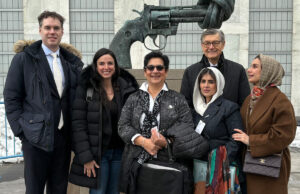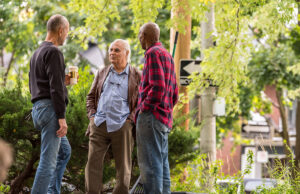An Insider’s Review of the European Ageing Network Congress: CARE 4.0 Change in Competence

By Dan Levitt
The Austrian Congress for Managers in Work with the Elderly and the Congress of the European Ageing Network combined in one international Congress bringing together managers in the field of long-term care to strengthen cooperation between leaders of services for older persons in Europe, to collectively seek answers to address the challenges confronting stakeholders in the sector, and to share solutions. While German was the predominant language spoken by delegates, English translation was available, and some sessions were delivered in English. Attendees came from 20 countries across four countries, although the vast majority were from Austria.
The purpose of Congress was to find new ways, solutions and approaches to the challenges facing the care and services for older persons:
- Long term care settings including digitalization using Artificial Intelligence (AI) and robotics.
- Finding solutions about staff recruitment and retention, upskilling and reskilling.
- Finding new funding models that would be sustainable and would secure long term care that is accessible and affordable for years to come.
Jiri Horecky, delivered the first plenary keynote talk entitled “Overview of the most important tasks, goals and activities”. A fundamental aspect of this presentation emerged as a significant aspect of the Congress that being transformational change needed to address the daunting issues that are being faced in the care of older persons.
“The measure of intelligence is the ability to change” Albert Einstein.
The uncomfortable truth about change is that “Everyone thinks of changing the world, but no one thinks of changing themselves”
Common reactions to change often include:
- Rejection both conscious and unconscious.
- Fear, anxiety of something we have no or low experience with.
- Being suspicious.
- Lack of courage.
- And sometimes we are afraid of failing.
Changes are divided into macro changes that impact system changes that are in hands of government, parliaments, and public bodies. At the micro change level individuals can start making these changes by initiating these changes and accelerating the macro changes.
Changes are often reactions to: new facts and new findings, innovation and technologies, threats and collapses in markets, change in paradigms and results of some movement and trends.
Changes require courage to step out of our box where we are secure and to admit that we are and may be wrong as well as determination and endurance.
Change is needed in Long Term Care
- Lack of resources
- Financial resources
- Funding models
- Shift of competence centralization or decentralization
- Public versus private
- Social protection
- Responsibility of individuals and their family members
- Human Resources
- Bigger challenges than money
- Lack of staff currently and future growth human resources needs
- Work migration
- Ageing workforce demographic
- Retaining staff
- Domestic, live in caregivers and the underdeclared work.
- Digitalization
- False expectations
- Ethical issues such as data protection
- Affordability
- Artificial Intelligence and robotics
- And what are the actual needs and expectations
- New Concepts
- New ways of living
- Innovation projects (UBER, time bank, buurtzorg)
- DEI, small households
- Smaller capacities more workers per client.
Yet, its not only the question of what we want but what we can do with our limited capacities and resources. Sometimes we do not ask the right question and we are questioning and verifying the resources.
The conference considered these and other challenges on this topic. Arguments, discussion, presentations about new approaches, as well as current challenges and problems were shared. Solutions for the path forward were considered.
Jiri closed his opening remarks with a quote by Carl Sandburg used by U.S. President Ronald Reagan while addressing Congress
”All we need to begin with is a dream that we can do better than before. All we need to have is faith, that the dream will come true. All we need to do is act, and the time for action is now.”
Katie Smith Sloan, CEO Global Ageing Network provided an inspiring address citing examples from around the world where aged care organizations are innovating programs and services for older persons. Addressing the challenges within various jurisdictions provides insight into how similar challenges might be addressed in other nations. Person centered approaches to services for older persons was one theme of her talk. She reinforced the importance, as a global network, of coming together to learn, share, innovate, and collaborate. None of us can successfully tackle global ageing alone.
Person Centered approaches to long term care was also the focus of Brendan McCormack, a plenary speaker from the University of Sydney. He offered a nursing lens on the provision of care. His main premise was that “A person-centered culture enables effective practices based on the formation and fostering of healthful relationships between all team members and key stakeholders. It has explicit values of respect for persons’ self-determination, mutual respect and understanding. It empowers all staff to engage in continuous development and quality enhancement.” He outlined, including significant challenges like acute-care oriented models, paternalistic and controlling regulatory mechanisms, workforce issues, interagency disconnects, policy and strategy weaknesses, and lack of strategic nursing leadership. Person centered approaches offer a singular all encompassing way of making a imprint on those you connect with in long term care.
Consensus from the speakers and delegates in educational sessions and in discussions offered a vision for the future of ageing that includes: living life to the fullest independently, person-centered living environments that includes an individual living space integrated into the broader community and neighborhood, specialist care services available as needed, a movement to community based services with less reliance on traditional care homes, and transition to a new system rather than optimizing the current system.
Care 4.0 EAN Congress provided delegates with insights into the old age sector in Europe, identifying innovative practices and hearing directly from leaders of the organizations that implement them. As the world’s population ages, it is important to investigate different ways of meeting the challenges aged care systems face, while learning new geriatric pathways and discovering innovative practices.
The next Global Ageing Network Conference takes place in September 7-8, 2023 in Glasgow Scotland and the following year the European Ageing Network is holding its bi-annual congress in Athens, Greece.
Hope to see you there!
Dan Levitt is a past GAN Board Member and currently a member of the Board of the International Federation of Ageing and CommonAge, an Adjunct Professor Gerontology, Simon Fraser University and the CEO of KinVillage in Vancouver, Canada.

Recently Added
February 19, 2026
Statement to the United Nations: February 2026
January 22, 2026




